Real music lovers can find the melody in everything. From the park to the concert hall, our friend Nelson Brill is always on the hunt for great sound. In this blog, Brill attends the oldest running folk festival in the United States to hear music from “the streets of Zimbabwe, Morocco and Cuba to the blues alleys of Chicago.”
FOLK MUSIC FLOURISHES AT THE 2017 LOWELL FOLK FESTIVAL AND IN A GLOWING JAZZ PARTNERSHIP
By Nelson Brill
AUGUST, 2017
The unbounded nature of folk music, with its global reach and its rich stories of love, struggle and glory, continues to astound. The vitality of folk music was heard in all its myriad forms at this year’s 31st edition of the venerable Lowell, MA. Folk Festival (“Festival”) the oldest running folk festival in the United States. This year’s edition, running from July 28-30th, was lit up with music that careened from the streets of Zimbabwe, Morocco and Cuba to the blues alleys of Chicago.
 Arriving at the Festival’s “Dutton Street Pavilion,” C.J. Chenier & The Red Hot Louisiana Band were performing under a huge tent rocking the classic tunes “Caldonia” and “Jambalaya (On The Bayou)” with infectious zydeco sway. Chenier’s accordion churned out flowing chords while his muscular partner on his “Frottoir” (a version of a washboard worn with a shoulder strap – first designed by C.J.’s father, Clifton Chenier, in 1946 Louisiana) provided the intense zing of a backbeat. Chenier sang with a rotund voice (containing ardor and grit) that punctuated the swirling music of his band. The capacity audience danced and swayed to the joyous grooves while Chenier’s accordion swept them along with his swashbuckling accordion.
Arriving at the Festival’s “Dutton Street Pavilion,” C.J. Chenier & The Red Hot Louisiana Band were performing under a huge tent rocking the classic tunes “Caldonia” and “Jambalaya (On The Bayou)” with infectious zydeco sway. Chenier’s accordion churned out flowing chords while his muscular partner on his “Frottoir” (a version of a washboard worn with a shoulder strap – first designed by C.J.’s father, Clifton Chenier, in 1946 Louisiana) provided the intense zing of a backbeat. Chenier sang with a rotund voice (containing ardor and grit) that punctuated the swirling music of his band. The capacity audience danced and swayed to the joyous grooves while Chenier’s accordion swept them along with his swashbuckling accordion.
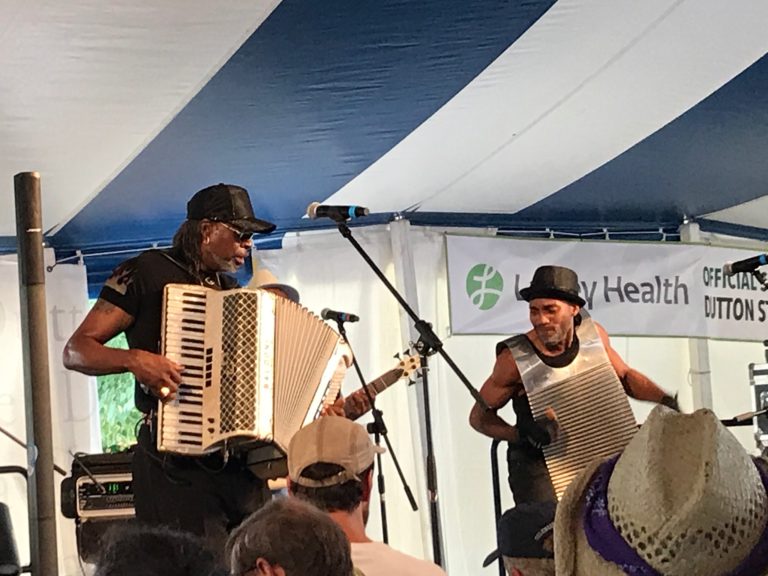
shakethetreeboston.com
Over at the Festival’s “Boarding House Park” stage, Toronzo Cannon and his quartet delivered a scorch of another variety: searing electric Chicago blues. Cannon utilized a rolling guitar style in which he slid his fingers seamlessly from one fret to another or hit hard a cluster of repeating notes in a circular, rapid-fire pattern.
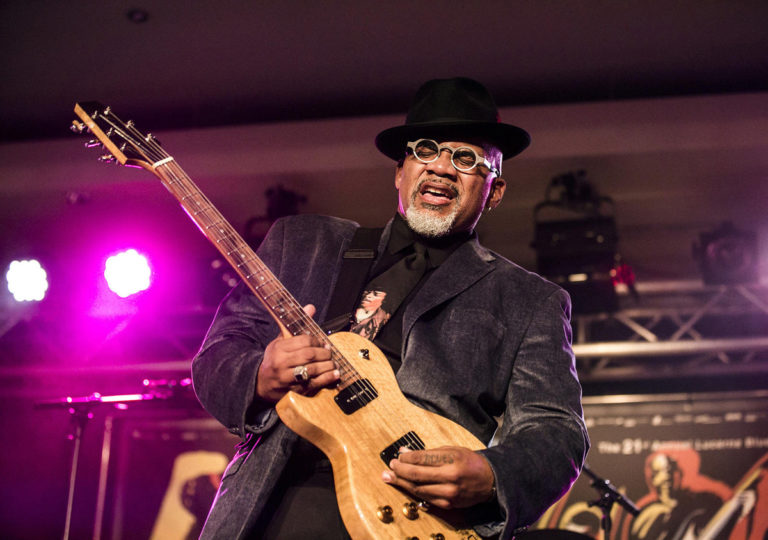
lowellsun
His rousing voice accompanied his guitar swagger and his songs of lost love and “bad contracts” – all delivered with gut-thumping heat. The classic Elmore James’ tune, “Look Over Yonder’s Wall [Hand Me Down My Walk’in Cane]”, was a pile-driving romp with the band’s young keyboardist battening down the hatches with his percussive, two-fisted barrelhouse runs.
In contrast to the molten heat from Cannon’s guitar, the guitarist fronting the band Mokoomba, (a band hailing from Victoria Falls, Zimbabwe), delivered the lightest of dancing notes and stutter-stepping phrases on his instrument. Mokoomba’s music combined expressive calls and vocals with the resonant pulse of congas and hand-held percussion to create undulating light grooves upon which members of the band surfed with their great high-stepping dance moves.
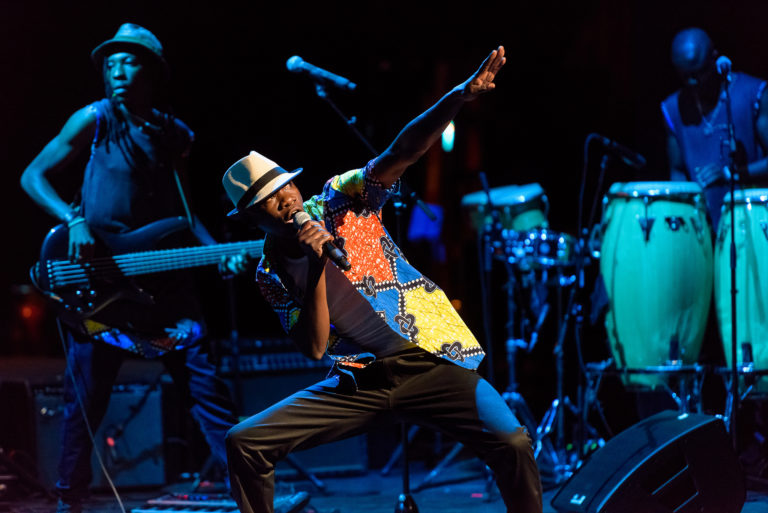
pri.org
Congas (and a variety of other indigenous drums) were also the resonant foundation underlying singer Betsayda Machado’s spirited performance of Cuban and Venezuelan folk music with the band, “La Parranda El Clavo”.

npr.org
Machado possessed a radiant voice (with a beautiful mix of expressive full power and tonal delicacy) and she joined with several other singers in performing Spanish songs and Yoruba chants that floated over the many drum calls below (accentuated by the whirling steps of dancers onstage).
At the Festival’s “Saint Anne’s Churchyard” stage, Americana folk and blues were nestled in the bows of the band Shadowgrass, who drove their bluegrass hard and fleet. These four young musicians took the capacity audience by storm with their sparkling banjo soars, acoustic guitar flourishes and a nimble, thumping bass that rode it all to glory.
The Festival would not complete, however, without hearing some of that sweet driving Memphis soul delivered hot and fresh by the Stax Music Academy Alumni Band.
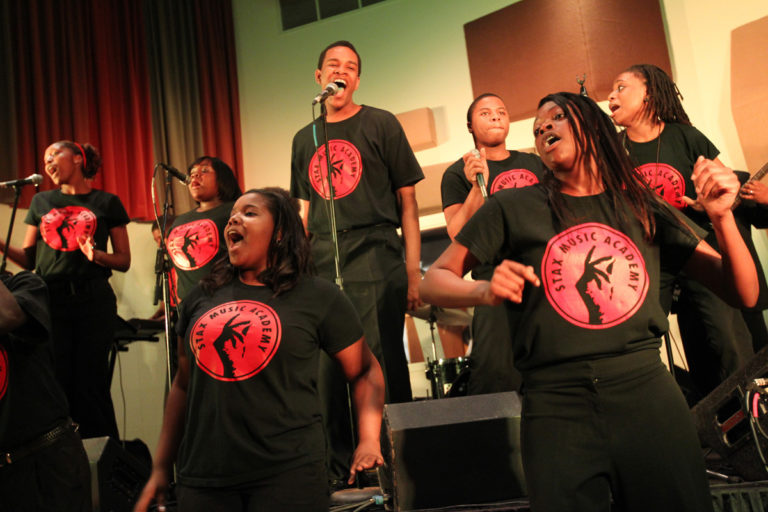
LowellSun
These young musicians tore up classic hits like “Rock Steady” and “I’ll Take You There” with soaring vocals (from their two powerhouse female vocalists and their male vocalist with a baritone as smooth as honey) propelled by a backing band of churning brass, guitar and drums. As the sun went down, the Stax Alumni Band took the Festival home with their deft vocal harmonies and their horns strutting in sharp, playful majesty.
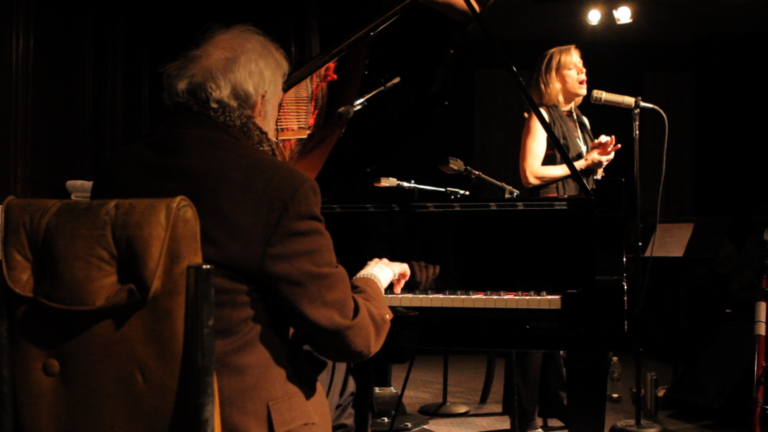
wbur.org
The rich veins of Americana folk and blues were also explored in another recent performance by two consummate Boston area musicians who create their own sweet and pungent stew from the griddle of folk roots music, poured creatively into their vessel of jazz improvisation. On July 22nd, vocalist Dominique Eade and pianist Ran Blake (both colleagues and educators at New England Conservatory’s Contemporary Improvisation Department, www.necmusic.edu), took to the welcoming stage of Thelonious Monkfish, (“Monkfish”) and delivered a sparkling recital before a transfixed capacity audience.

Derek Rubinoff
Monkfish (www.theloniousmonkfish.com) is a delectable restaurant and music venue run by its amicable, music-loving proprietor Jamme Chantler and his musical coordinator, Scott Goulding, himself an accomplished jazz drummer with bands such as the dynamic Yoko Miwa Trio that frequently appears at Monkfish. (Pianist Yoko Miwa and her Trio have a new album out this summer entitled Pathways and it is a stellar outing with great melodic beauty and creative artistry to explore [See www.yokomiwa.com]).
The sound at Monkfish is very good and at the Eade/Blake recital, another NEC alumnus, Jeremy Sarna, manned the sound controls to produce a sound that captured the partnership of Eade and Blake in soaring flight. The sound had excellent tactile detail, a natural balance to piano and voice and offered a clear window to hear every crisp isolated note and thunderous resonant cloud in Blake’s intrepid piano explorations.
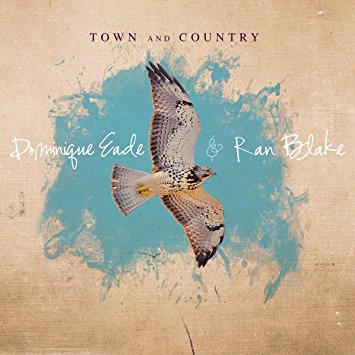
At their Monkfish performance, Eade and Blake celebrated their new duet recording Town and Country [Sunnyside; www.sunnysiderecords.com), an audiophile gem which is particularly noteworthy in its sound quality for its capturing of ambient space: an empty NEC Jordan Hall with all of its splendor of flowing air and deep resonance.
Their Monkfish recital roved from every corner of this recording’s expansive folk and blues territory. The concert opened with William Schumann’s “Pretty Fly and Lullaby,” with Eade perched on the most gentle of free-flowing high notes and runs, (with some creative bird call-like sounds whispered into her mix). “Winter in Madrid” was another garland of high fleeting vocal gifts from Eade: her voice here resembled a young tern learning to fly at an ocean’s edge. Her voice dove, swerved and dipped to express the beauty and depth of her songs with creative and unpredictable zest. Blake’s piano was like the partnering wind to her wings: his spontaneous bellows of chord colors, pedal holds or prickly jumping notes always sent Eade flying in a new vocal direction or swoop.
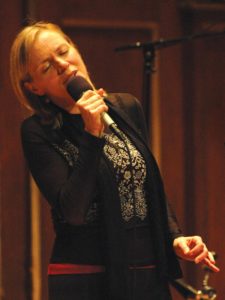
jazzedmagazine.com
The rich folk, gospel and blues songs from their Town and Country recording sometimes rang out with thunder in Blake’s prodigious keyboard crashes or, at other times, were drenched in the lightness (like nourishing, falling rain) from Eade’s slippery bebop scat. “Moon River” glowed with Eade’s voice lustrous and strong (tethered to Blake’s bluesy chords). “Elijah Rock” also glowed with gospel fervor on Eade’s sassy and brazen vocals that concluded with her retreating from her microphone to echo the phrase “Lord, Lord” in cascading light calls. On Dylan’s “Its Alright, Ma (I’m Only Bleeding)”, Eade turned her voice into a talking, penetrating slipstream of words that rang with condemnation, sarcasm and knife-sharp edges as Blake responded with arresting stop and start keyboard quips that rang out like shotgun blasts.
The music on Town and Country seeps into every emotional crevice of Americana roots music: it can be prickly; it can be warmly inviting or it can be blistering in its condemnation of human suffering. Johnny Cash’s “Give My Love To Rose” (a moving ballad on the human cost of imprisonment) and “The Easter Tree” (an old English protest song against racist violence with the stark imagery of a lynching at its core) lurched on Blake’s spare piano notes and Eade’s pouncing vocals. (Eade concluded “Easter Tree” by holding the last word- “Stone” – for several seconds to deliver a wallop of vocal power and intensity). “Memphis,” Blake’s short instrumental composition for Martin Luther King, shuddered with thunderous clouds of ominous chords contrasted with the lightest of piano touches- as if to portent the spark of new possibilities.
In contrast to these penetrating numbers, Eade and Blake also performed a light and glittering “Moonlight In Vermont” (a highlight of gentle sway and lilting creativity) and Eade performed a riveting scat solo piece in which she played an imaginary wind instrument (with her fingers outstretched before her) concocting percussive sounds up and down her nimble register.
The recital came to a close on the meditative theme of a beautiful spoken word/singing tribute to another Americana folk hero: the sage activist Henry David Thoreau (whose bicentennial is being celebrated this year). In this unfurling poetic moment, spoken text and vocals curled around Blake’s floating clouds of soft velvety piano colors until they disappeared in a final wisp of Eade’s fragile held soar.
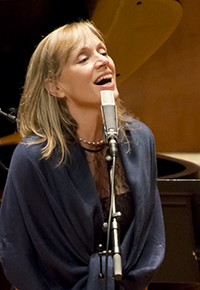
If you would like to read more reviews like this one, visit Nelson’s blog at www.bostonconcertreviews.com.

